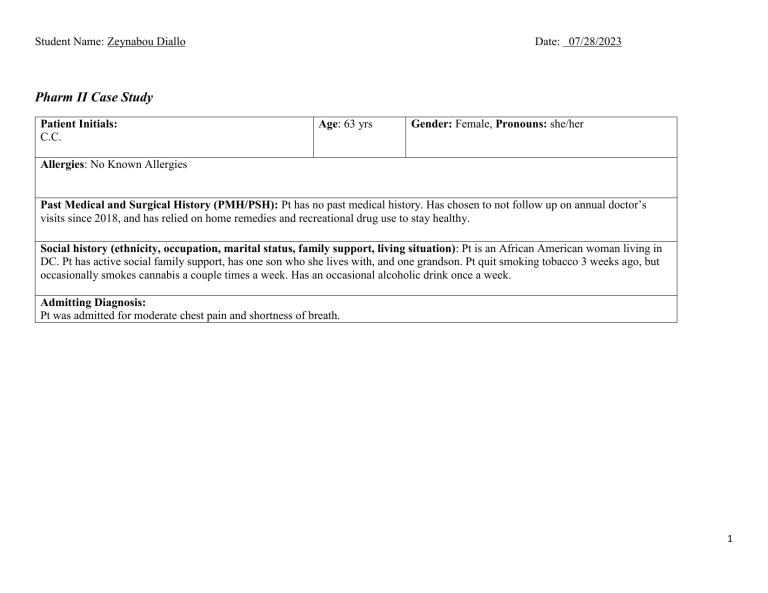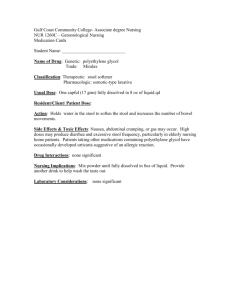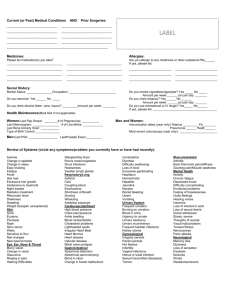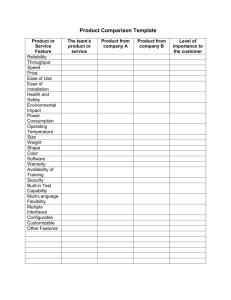
Student Name: Zeynabou Diallo Date: 07/28/2023 Pharm II Case Study Patient Initials: C.C. Age: 63 yrs Gender: Female, Pronouns: she/her Allergies: No Known Allergies Past Medical and Surgical History (PMH/PSH): Pt has no past medical history. Has chosen to not follow up on annual doctor’s visits since 2018, and has relied on home remedies and recreational drug use to stay healthy. Social history (ethnicity, occupation, marital status, family support, living situation): Pt is an African American woman living in DC. Pt has active social family support, has one son who she lives with, and one grandson. Pt quit smoking tobacco 3 weeks ago, but occasionally smokes cannabis a couple times a week. Has an occasional alcoholic drink once a week. Admitting Diagnosis: Pt was admitted for moderate chest pain and shortness of breath. 1 Student Name: Zeynabou Diallo Drug Name (Generic and Brand) Date: 07/28/2023 Dose/Freq/Route Med Class Indications Why is this patient taking this med? Link to diagnosis, history or PRN indication (be specific) Mechanism of Action Acetaminophen (Tylenol) 1,000 mg/q8H/Oral Nonopioid Analgesic This drug is a pain reliever for mild to moderate pain. The pt is experiencing localized pain. Inhibition of central prostaglandins synthesis Albuterol 2.5 mg/q4H PRN/Inhaled Beta2 Agonist This drug is used to open the airways in lung diseases where spasm may cause breathing problems. This will provide dyspnea relief for patient. Relaxes bronchial smooth muscle by action on beta2receptors with little effect on heart rate. Ibuprofen (Ibuprofen) 400 mg/Q8H/Oral NonOpioid Analgesic Used to ease pain, swelling, and fever. This drug will ease localized pain in pt. Lidocaine (Lidocaine) 5% Topical Film/Daily/Tran sdermal Analgesic This drug is used to ease the pt’s right sided chest pain. Polyethylene Glycol 3350 (Miralax) 17 gm/Daily/Powd er Laxative Used to treat pt’s experienced constipation and ease passing of stool. Reversibly inhibits cyclooxygenase-1 and 2 (COX-1 and 2) enzymes, which results in decreased formation of prostaglandin precursors Blocks both the initiation and conduction of nerve impulses by decreasing the neuronal membrane's permeability to sodium ions An osmotic agent, polyethylene glycol 3350 causes water retention in the stool; increases stool frequency. Nursing Considerations/ Patient Education Assess pt’s allergies and previous reactions to drug with same ingredients before administering. Assess pt’s pain level after a couple of hours after admin. Ensure resuscitation equipment is at bedside in case for acute complication with drug. Monitor vitals and breathing while before, during, and after administering this drug. Notify your healthcare team of any allergies to aspirin or (NSAIDs) like ibuprofen or naproxen. Re-assess pain level and Pt comfortability a few hours after administration. Do not allow patch to stay on pt’s skin for over 12 hours at a time. Allow 12 hours without a patch. Re-assess pain score after a couple of hours of admin. Assess ability to pass stool shortly after administering medication. Assess for abdominal distension and bowel sounds. 2 Student Name: Zeynabou Diallo Date: 07/28/2023 Drug Name (Generic and Brand) Dose/Freq/Route Med Class Atorvastatin (Lipitor) 10mg/Evenings/ Oral Antihyperlipide mic Ethanol Topical (Nozin) 1 amp/BID/Topic al Sennosides-Docusate (Docusate-Senna) 50 mg/BID/Oral Indications Why is this patient taking this med? Link to diagnosis, history or PRN indication (be specific) Mechanism of Action Nursing Considerations/ Patient Education Used to treat pt’s high cholesterol levels Inhibits enzyme HMGCoA blocking synthesis of cholesterol agents. Antiseptic Reduces MRSA infection, and additional protection from Hospitalassociated infections during pt’s admission. Laxative; Stimulant Used to treat pt’s experienced constipation and to ease the passing of stool. Inhibits alcohol dehydrogenase (AD), an enzyme that catalyzes the metabolism of ethylene glycol and methanol to their toxic metabolites. Docusate is a stool softener; sennosides are laxatives. Report any signs of muscle pain,weakness, fever, and dark urine. Report signs of liver damage (jaundice, fatigue, abdominal discomfort)Monitor LFTs and Creatinine Kinase levels. Monitor pt for nose bleeding and irritation. Have antihistamines readily available in case of allergic reactions. Reassess client for ease with passing stools. Monitor for bloody stools and rectal bleeding. 3




